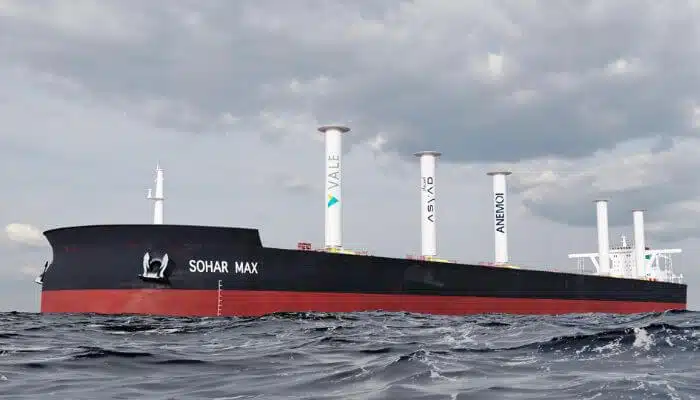Oman’s wholly state-owned ore carrier Sohar Max will be fitted with rotor sails to harness wind energy on its voyages to and from the Sultanate of Oman. This will be a first such initiatiev for Oman’s ocean-going maritime cargo transportation sector.
To this end, Vale and Omani’s Sohar Max, owned by Asyad Shipping, a subsidiary of Asyad Group will install wind-assisted propulsion technology on the world’s largest ore carrier, a 400,000 metric tonne capacity Very Large Ore Carrier (VLOC) that falls in the category of the world’s largest ore carriers, known as Valemax.
As per the statement, together with three other similar-sized VLOCs owned by Asyad Shipping, it is exclusively deployed for the transportation of iron ore from mining conglomerate Vale’s production sites in Brazil to Vale’s wholly owned iron ore pelletising plant in Sohar Port.
As per the framework agreement with Asyad Shipping,Vale will be responsible for the retrofitting of rotor sails on the 362-metre-long Sohar Max. Further, Vale has tapped the UK-based provider of wind power solutions for the shipping industry, Anemoi, to retrofit the Sohar Max with the rotor sails.
The firm said that all five of these modern mechanical sails having around 5-metre diameter, will be installed on the deck of the VLOC. The spinning action of cylinders harness the renewable power of the wind to propel ships, thus reducing fuel consumption and lowers harmful emissions entering the atmosphere.
“The rotor sails can deliver efficiency gains of up to 6 per cent, while cutting CO2 equivalent emissions by up to 3,000 tonnes per ship per year, according to Vale. In favourable wind conditions, the rotor sails also contribute to maintaining the speed of the vessel and reducing sailing times,” said the firm in its note.
“The pact to retrofit the Sohar Max with rotor sails is one of six innovative technologies that Vale pledged to pilot on the four Valemax ships chartered by the Brazilian miner for deliveries of iron ore to Sohar,” it added further.
“These actions to incorporate cutting-edge technologies into navigation are part of the Ecoshipping programme, an R&D initiative created by Vale’s shipping area to meet the company’s challenge of reducing its carbon emissions, in line with the ambitions set by the International Maritime Organization (IMO),” the Brazilian company added in a statement.
“Wind energy will play a central role in our strategy to decarbonise the maritime transportation of iron ore,” said Vale’s Shipping Technical Manager, Rodrigo Bermelho.
“In addition, all these Ecoshipping pilot projects will produce valuable information for the next generation of Guaibamax ships,” he added in a statement.
“Rotor sails are a cost-effective, proven technology that can help ship-owners comply with International Maritime Organisation emission reduction targets and regulations. Average savings would be in the order of 17 million tonnes of bunker, along with 56 million tonnes of CO2-equivalent in emissions per annum, if every suitable vessel is fitted with rotor sails,” said the statement.
“Rotor Sails have demonstrated increased vessel efficiency, reducing fuel consumption, bunker costs and harmful emissions. Compared to other wind propulsion technologies, Rotor Sails offer a much greater thrust force to propel the ship per square metre of sail area. This means they can be made more cost effectively and with less impact on vessel operation than traditional sails or wings,” Anemoi stated.
To produce and deliver Rotor Sails, Anemoi has built a robust supply chain in China through collaborations with CSSC Chengxi, Lianyungang Zhongfu Lianzhong Composite Material Group, CRRC Corporation, and SaierNico Electric & Automation.
In cooperation with SDARI and Lloyd Register, they will also offer technical services, vessel integration design, project management, and post-delivery support for equipment design approval and classification.


